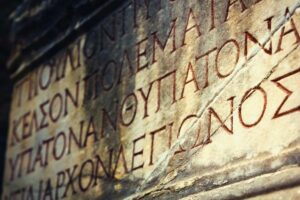The year is 480 BCE. The mighty Persian Empire, led by King Xerxes I, stormed through Greece, overwhelming city-states and crushing resistance. Salamis: The Battle that shaped the fate of Europe. Athens has already fallen; its temples lie in ruins, and its people have fled. But the Greeks are not yet defeated. Athenian leader Themistocles has a daring plan—a plan that will turn the tide of war.
The Greek fleet, vastly outnumbered, has gathered in the narrow Straits of Salamis. Here, between the island of Salamis and the Athenian coast, they prepare for a final stand. They have around 370 triremes, small and swift, against the Persian fleet of over 1,000 ships—a massive armada from Phoenicia, Egypt, and Ionia.
Themistocles knows that in open waters, the Greeks will be crushed. But in the straits, where manoeuvring is difficult, the Persian numbers will count for nothing. So he resorts to deception. He sends a secret message to Xerxes, claiming that the Greek alliance is breaking apart, that some ships plan to flee, and that now is the perfect time to strike. Xerxes, eager for victory, takes the bait. He orders his fleet to block every escape route, ensuring that the Greeks cannot retreat. The trap is set.
As dawn breaks, the Persian fleet surges forward. From his golden throne on Mount Aigaleo, Xerxes watches, confident of his triumph. But below, something unexpected happens. The Greek ships, instead of retreating, charge forward. The Athenian admiral Ameinias of Pallene leads the first attack, ramming a Persian vessel.
A great battle erupts. The Greek war cry echoes across the waters:
Ὦ παῖδες Ἑλλήνων, ἴτε! ἐλευθεροῦτε πατρίδ᾽, ἐλευθεροῦτε δὲ παῖδας, γυναῖκας, θεῶν τε πατρῴων ἕδη, θήκας τε προγόνων· νῦν ὑπὲρ πάντων ἀγών.!” (“O sons of the Greeks, advance! Free your fatherland, free your children, your wives, the altars of the gods of your fathers, and the tombs of your ancestors: now is the battle for everything.”) — Aeschylus, The Persians
The narrow straits become a chaotic slaughterhouse. The large Persian ships struggle to turn and collide with each other. Greek triremes, lighter and more agile, ram, board, and destroy their enemies. The Persian captains panic.
From his throne, Xerxes sees his mighty fleet disintegrate. He had expected a swift victory, but instead, his ships are trapped and burning. Even his most elite squadron, the Phoenician fleet, is overwhelmed. Queen Artemisia of Halicarnassus, the only female commander in his navy, fights bravely, even ramming an allied Persian ship to escape.
The Greeks, now sensing total victory, drive the Persians into full retreat. The once-invincible Persian fleet is destroyed, and what remains flees to safety.
Humiliated, Xerxes abandons his invasion, returning to Persia. His remaining forces in Greece, led by Mardonius, will be defeated a year later at Plataea.
Greece is saved.
Themistocles, the mastermind behind the victory, becomes the hero of the war. The battle proves that strategy, unity, and courage can overcome overwhelming odds.
Salamis secures the freedom of Greece, ensuring that Greek culture, democracy, and philosophy will shape the future of Western civilization.
Aeschylus, as a veteran of the battle, immortalizes the moment in “The Persians”, reminding us of the fate of those who seek to enslave free men:
“Ρέει δ’ ὁ πόντος ναυαγίων τε καὶ φόνου.”
(“The sea was filled with wreckage and blood.”)
But, what If Greece Had Lost?
1. Greek Cities Would Have Fallen
2. Persian Rule Over Europe
3. No Athenian Democracy
4. No Western Philosophy, Science, or Arts as We Know Them The legacy of Greek thought, which influenced Rome and later Europe, might have been erased or drastically changed.
The Battle of Salamis was not just a Greek victory. It was a triumph of freedom against tyranny, a moment where history could have turned another way—but did not.
Sources – Ancient texts :
1. Herodotus – Histories (Book 8)
2. Aeschylus – The Persians
3. Plutarch – Life of Themistocles
4. Diodorus Siculus – Bibliotheca historica (Book 11)
5. J. F. Lazenby – The Defence of Greece 490-479 BC
6. Peter Green – The Greco-Persian Wars
7. The Battle of Salamis: The Naval Encounter that Saved Greece—and Western Civilization
A big Thanks to @HomerPavlos! Great Work!












